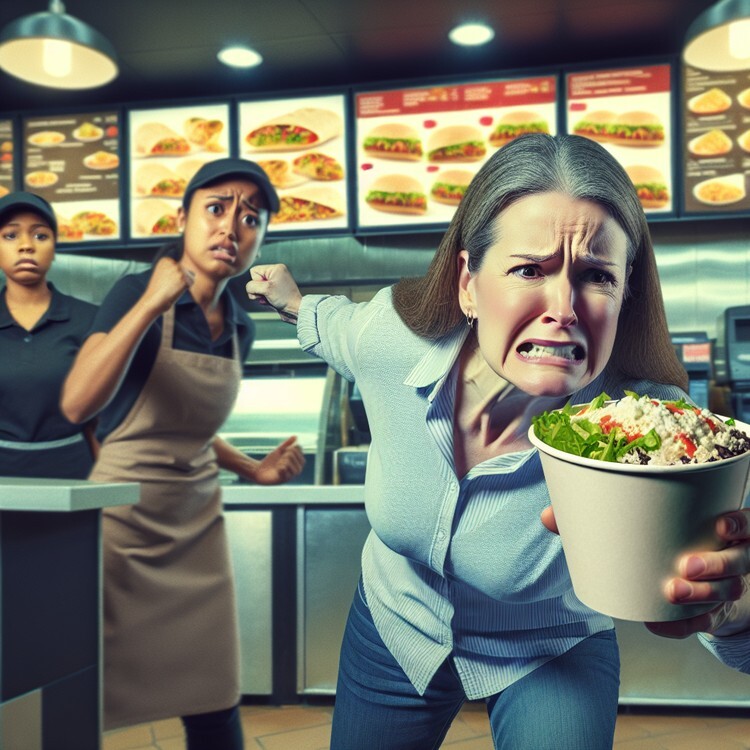Shop owners, especially those who run smaller businesses, are facing more and more challenges when it comes to theft. Isabella Day, who owns a jewellery shop called The Remarkable Goldsmiths in Dartmouth, has had £3,000 worth of stuff stolen in just two years. Even though she sells expensive things, Day doesn’t want to lock her door because she wants her shop to feel welcoming. To try and stop theft, she’s bought an alarm system, cameras, and a doorbell camera that records everything. The footage from the doorbell camera helped the police catch a thief who stole a necklace worth £685.
Shoplifting is going up in the UK. In the year leading up to June 2023, there was a 25% increase in shoplifting cases in England and Wales. Shoplifting costs about £953 million in the UK and over $112 billion in the US. This makes it more expensive for shops to run, and they have to charge customers more money. Shops are trying different things to stop shoplifters, like giving money to the police for more surveillance, hiring undercover guards, and giving rewards to police officers.
But for small businesses, these fancy ways of stopping theft can seem like a luxury, especially when times are tough. Tina McKenzie from the Federation of Small Businesses (FSB) says that small businesses often get targeted by criminals, but these crimes aren’t always taken seriously. Lots of small business owners don’t think that reporting crimes to the police will actually help catch the criminals.
It’s really important for small businesses to have a safe and stable environment. The Co-op, a shop in the UK, has done lots of things to stop theft, like having CCTV cameras, panic buttons, and communication headsets. They’re also looking into using AI to watch self-service checkouts and spot when people are hiding things. But there isn’t one perfect way to stop theft, and it might take a mix of guards and technology to do it.
In the future, AI is going to be a big help in stopping theft. It could watch people using self-service checkouts and spot when they’re hiding things, which would mean the police could get there quicker. But it’s also important to deal with the reasons why people steal things, like addiction, so that we can have a society where businesses don’t have to worry about theft all the time.
Original news source: Shop owners hope that tech can deter thieves (BBC)
Listen
Slow
Normal
Fast
Group or Classroom Activities
Warm-up Activities:
– News Summary
Instructions: Students will be given the article to read for a few minutes. Afterward, they will work in small groups to summarize the main points of the article in their own words. Each group will then present their summary to the class. This activity will help students with comprehension and summarization skills.
– Opinion Poll
Instructions: Create a list of statements about the issues presented in the article such as “Small businesses should invest more in security” or “The police should take shoplifting more seriously.” Students will walk around the room and poll their classmates on whether they agree or disagree with the statements. Students will then discuss the results and their own opinions, practicing the language of agreement and disagreement.
– Future Predictions
Instructions: After reading the article, students will work in pairs to discuss and write down their predictions about the future of theft prevention, particularly the role of AI as mentioned in the article. They can also think about how the society might change in terms of addressing the root causes of theft. They will then share their predictions with the class and justify their reasoning.
– Vocabulary Pictionary
Instructions: Select key vocabulary words from the article (e.g., theft, surveillance, self-service checkouts, AI, etc.). Divide the class into two teams. Members of each team take turns drawing the words on the board without speaking, while their teammates try to guess the word. This activity helps with vocabulary recall and understanding.
– Pros and Cons
Instructions: Divide students into small groups and assign each group to list the pros and cons of different theft prevention methods mentioned in the article, such as CCTV, AI technology, hiring undercover guards, and giving rewards to police officers. After they have compiled their lists, groups will present their findings and the class can discuss the most balanced approaches to preventing shoplifting. This encourages critical thinking and persuasive speaking skills.
Comprehension Questions:
1. What is the name of the jewellery shop mentioned in the article, and who owns it?
2. How much has Isabella Day lost due to theft in the past two years?
3. What security measures has Isabella Day implemented in her shop to prevent theft?
4. By what percentage did shoplifting cases increase in England and Wales in the year leading up to June 2023?
5. What is the estimated cost of shoplifting to businesses in the UK and the US?
6. Why do small businesses find it difficult to invest in advanced theft prevention methods?
7. What steps has the Co-op taken to address the issue of theft in their stores?
8. What future technology is mentioned as a potential aid in reducing theft, and how might it work?
Go to answers ⇩
Listen and Fill in the Gaps:
Shop owners, especially those who run smaller businesses, are facing more and more challenges when it comes to theft. (1)______ Day, who owns a jewellery shop called The Remarkable Goldsmiths in Dartmouth, has had £3,000 worth of stuff stolen in just two (2)______. Even though she sells expensive things, Day doesn’t want to lock her door because she wants her shop to feel welcoming. To try and stop theft, she’s bought an alarm system, cameras, and a doorbell camera that records everything. The (3)______ from the doorbell camera helped the police (4)______ a thief who stole a necklace worth £685.
Shoplifting is (5)______ up in the UK. In the year leading up to June 2023, there was a 25% increase in shoplifting cases in England and Wales. Shoplifting costs about £953 million in the UK and over $112 billion in the US. This (6)______ it more expensive for shops to run, and they have to charge customers more (7)______. Shops are trying different things to stop shoplifters, like giving money to the police for more surveillance, hiring undercover guards, and giving rewards to police officers.
But for small (8)______, these fancy ways of stopping theft can seem like a luxury, especially when times are tough. Tina McKenzie from the Federation of (9)______ Businesses (FSB) says that small businesses often get targeted by criminals, but these crimes aren’t always taken seriously. Lots of small business (10)______ don’t think that reporting crimes to the police will actually help catch the criminals.
It’s really important for small businesses to have a safe and stable environment. The Co-op, a shop in the UK, has done lots of things to stop theft, like having CCTV (11)______, panic buttons, and (12)______ headsets. They’re also looking into using AI to (13)______ self-service checkouts and spot when people are (14)______ (15)______. But there isn’t one perfect way to stop theft, and it might take a mix of guards and technology to do it.
In the future, AI is going to be a big help in (16)______ theft. It could watch people using self-service checkouts and spot when they’re hiding things, which would mean the police could get there quicker. But it’s also important to deal with the reasons why people steal things, like addiction, so that we can have a society where businesses don’t have to worry about theft all the time.
Go to answers ⇩
Discussion Questions:
Students can ask a partner these questions, or discuss them as a group.
1. What is shoplifting and have you ever seen it happen?
2. How would you feel if you owned a shop and things were stolen from it?
3. Do you like the idea of shops using cameras to watch for thieves? Why or why not?
4. Do you think it’s fair for stores to charge more for items because of theft? Why?
5. Have you ever worked in a shop? If so, did you have to deal with shoplifters?
6. What do you think about using AI to prevent theft at self-service checkouts?
7. Do you believe that small crimes like shoplifting are taken seriously by the police in your area?
8. How important do you think it is for a shop to feel welcoming?
9. Would you prefer to shop at a place with lots of security or one with less? Why?
10. What are some reasons you think people might steal from shops?
11. Do you think offering rewards to police officers for catching shoplifters is a good idea?
12. Have you or someone you know ever been falsely accused of shoplifting? How did that make you feel?
13. What is a “panic button” and how do you think it helps in a shop?
14. Do you think it’s better to have human guards or technology like cameras for security? Why?
15. Do you think society can ever fully solve the problem of theft? Why or why not?
Individual Activities
Vocabulary Meanings:
Match each word to its meaning.
Words:
1. challenges
2. theft
3. shoplifting
4. surveillance
5. criminals
6. environment
7. technology
8. addiction
Meanings:
(a) The act of stealing something
(b) People who commit crimes
(c) The act of stealing from a shop
(d) Difficulties or problems that need to be overcome
(e) A strong need or dependence on something, often harmful
(f) The use of scientific knowledge and tools to solve problems or achieve goals
(g) The use of cameras and other devices to monitor and record activities
(h) The surroundings or conditions in which something exists
Go to answers ⇩
Multiple Choice Questions:
1. What is one reason why Isabella Day doesn’t want to lock her shop door?
(a) She doesn’t have a key
(b) She doesn’t care about theft
(c) She wants to make it easier for thieves
(d) She wants her shop to feel welcoming
2. What has Isabella Day done to try and stop theft in her shop?
(a) Locked her door
(b) Hired undercover guards
(c) Bought an alarm system, cameras, and a doorbell camera
(d) Given money to the police
3. What is one thing shops are doing to try and stop shoplifters?
(a) Charging customers less money
(b) Ignoring shoplifting cases
(c) Encouraging shoplifting
(d) Giving money to the police for more surveillance
4. Why do small businesses often get targeted by criminals?
(a) They have lots of money
(b) They have strong security systems
(c) They are seen as easy targets
(d) They don’t report crimes to the police
5. What has The Co-op done to stop theft in their shop?
(a) Hired undercover guards
(b) Installed CCTV cameras, panic buttons, and communication headsets
(c) Given money to the police
(d) Used AI to watch self-service checkouts
6. How could AI help in stopping theft in the future?
(a) By watching people using self-service checkouts and spotting when they’re hiding things
(b) By ignoring theft cases
(c) By making theft easier
(d) By increasing the cost of running a shop
7. Why is it important to deal with the reasons why people steal things?
(a) So that businesses don’t have to worry about theft all the time
(b) So that AI can watch self-service checkouts
(c) So that small businesses can charge customers more money
(d) So that small businesses can hire more guards
8. What is one thing small businesses can do to create a safe and stable environment?
(a) Ignore theft cases
(b) Install security systems like CCTV cameras and panic buttons
(c) Charge customers less money
(d) Encourage shoplifting
Go to answers ⇩
True or False Questions:
1. Shoplifting in the UK has seen a 25% decrease in cases in the year leading up to June 2023.
2. The use of AI in the future could help in stopping theft by monitoring self-service checkouts and identifying suspicious behavior.
3. Day has neglected to invest in security measures such as an alarm system, cameras, and a doorbell camera.
4. Isabella Day, owner of a jewellery shop, has had £3,000 worth of items stolen in just two years.
5. Shoplifting costs about £953 million in the UK and over $112 billion in the US combined.
6. Small businesses often get targeted by criminals, but these crimes are not always taken seriously.
7. Shop owners, especially those with smaller businesses, are facing increasing challenges with theft.
8. The footage from the doorbell camera hindered the police from catching a thief who stole a necklace worth £685.
Go to answers ⇩
Write a Summary:
Write a summary of this news article in two sentences.
Check your writing now with the best free AI for English writing!
Writing Questions:
Answer the following questions. Write as much as you can for each answer.
Check your answers with our free English writing assistant!
1. What problem is Isabella Day facing with her jewellery shop, and what has she done to address it?
2. How much has shoplifting increased in England and Wales, and what impact does this have on businesses?
3. What are some of the measures that shops are taking to prevent theft?
4. Why might small business owners be hesitant to report crimes to the police, according to Tina McKenzie?
5. What role could AI play in the future to help reduce theft, and why is it important to understand the reasons behind people stealing?
Answers
Comprehension Question Answers:
1. What is the name of the jewellery shop mentioned in the article, and who owns it?
The jewellery shop is called The Remarkable Goldsmiths, and it is owned by Isabella Day.
2. How much has Isabella Day lost due to theft in the past two years?
Isabella Day has lost £3,000 worth of items due to theft in the past two years.
3. What security measures has Isabella Day implemented in her shop to prevent theft?
Isabella Day has bought an alarm system, cameras, and a doorbell camera that records everything to prevent theft in her shop.
4. By what percentage did shoplifting cases increase in England and Wales in the year leading up to June 2023?
Shoplifting cases in England and Wales increased by 25% in the year leading up to June 2023.
5. What is the estimated cost of shoplifting to businesses in the UK and the US?
Shoplifting costs businesses about £953 million in the UK and over $112 billion in the US.
6. Why do small businesses find it difficult to invest in advanced theft prevention methods?
Small businesses find it difficult to invest in advanced theft prevention methods because they can seem like a luxury, especially during tough times.
7. What steps has the Co-op taken to address the issue of theft in their stores?
The Co-op has taken steps such as installing CCTV cameras, implementing panic buttons, and using communication headsets. They are also exploring the use of AI to monitor self-service checkouts for theft.
8. What future technology is mentioned as a potential aid in reducing theft, and how might it work?
AI is mentioned as a future technology that could help reduce theft. It could monitor people using self-service checkouts and detect when they are hiding items, allowing the police to respond more quickly.
Go back to questions ⇧
Listen and Fill in the Gaps Answers:
(1) Isabella
(2) years
(3) footage
(4) catch
(5) going
(6) makes
(7) money
(8) businesses
(9) Small
(10) owners
(11) cameras
(12) communication
(13) watch
(14) hiding
(15) things
(16) stopping
Go back to questions ⇧
Vocabulary Meanings Answers:
1. challenges
Answer: (d) Difficulties or problems that need to be overcome
2. theft
Answer: (a) The act of stealing something
3. shoplifting
Answer: (c) The act of stealing from a shop
4. surveillance
Answer: (g) The use of cameras and other devices to monitor and record activities
5. criminals
Answer: (b) People who commit crimes
6. environment
Answer: (h) The surroundings or conditions in which something exists
7. technology
Answer: (f) The use of scientific knowledge and tools to solve problems or achieve goals
8. addiction
Answer: (e) A strong need or dependence on something, often harmful
Go back to questions ⇧
Multiple Choice Answers:
1. What is one reason why Isabella Day doesn’t want to lock her shop door?
Answer: (d) She wants her shop to feel welcoming
2. What has Isabella Day done to try and stop theft in her shop?
Answer: (c) Bought an alarm system, cameras, and a doorbell camera
3. What is one thing shops are doing to try and stop shoplifters?
Answer: (d) Giving money to the police for more surveillance
4. Why do small businesses often get targeted by criminals?
Answer: (c) They are seen as easy targets
5. What has The Co-op done to stop theft in their shop?
Answer: (b) Installed CCTV cameras, panic buttons, and communication headsets
6. How could AI help in stopping theft in the future?
Answer: (a) By watching people using self-service checkouts and spotting when they’re hiding things
7. Why is it important to deal with the reasons why people steal things?
Answer: (a) So that businesses don’t have to worry about theft all the time
8. What is one thing small businesses can do to create a safe and stable environment?
Answer: (b) Install security systems like CCTV cameras and panic buttons
Go back to questions ⇧
True or False Answers:
1. Shoplifting in the UK has seen a 25% decrease in cases in the year leading up to June 2023. (Answer: False)
2. The use of AI in the future could help in stopping theft by monitoring self-service checkouts and identifying suspicious behavior. (Answer: True)
3. Day has neglected to invest in security measures such as an alarm system, cameras, and a doorbell camera. (Answer: False)
4. Isabella Day, owner of a jewellery shop, has had £3,000 worth of items stolen in just two years. (Answer: True)
5. Shoplifting costs about £953 million in the UK and over $112 billion in the US combined. (Answer: False)
6. Small businesses often get targeted by criminals, but these crimes are not always taken seriously. (Answer: True)
7. Shop owners, especially those with smaller businesses, are facing increasing challenges with theft. (Answer: True)
8. The footage from the doorbell camera hindered the police from catching a thief who stole a necklace worth £685. (Answer: False)
Go back to questions ⇧















